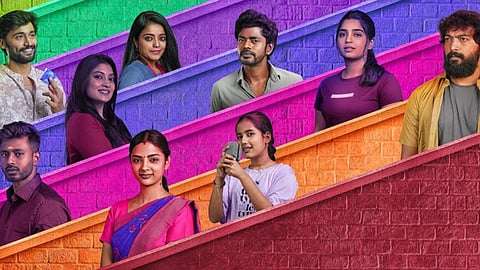Hot Spot Movie Review: Addresses taboos adeptly but falters in execution
Hot Spot(2.5 / 5)
Vignesh Karthick's penchant for shock value is no secret to those who have watched his Yours Shamefully films and his other features. His latest, Hot Spot, takes this tactic to a new level. The trailer of Hot Spot dives headfirst into clickbait territory, stirring controversy that practically begs viewers to watch, if only to critique. This, however, proves to be a clever marketing ploy. The actual film steers clear of the trailer's sensationalism, tackling similar themes—patriarchy, incest, sexual permissiveness—with a more responsible approach than what the trailer hints at. While the filmmakers' intentions are noble, Hot Spot stumbles with jarring tonal shifts and inconsistent portrayals.
Director: Vignesh Karthick
Cast: Gouri Kishan, Adithya Bhaskar, Sandy, Ammu Abhirami, Janani, Subash, Kalaiyarasan, Sophiya
Hyperlinked by Vignesh Karthick, who also plays a fictional filmmaker within the film, Hot Spot tackles four critical societal issues that compel the viewers to question their own definitions of right and wrong while prompting introspection about the need for change. While the four stories are independent, they culminate in a central theme: morality is often subjective and shaped by selfishness.
Vignesh Karthick is known for wacky premises, as evident in his previous film Adiyae. True to form, his Hot Spot features unconventional scenarios, like Dhanya (Gouri Kishan) tying a nuptial chain around Vijay’s (Adithya Bhaskar) neck, or a child asking her father whether she is sexy in her dress. It delves into gender role reversal and incest, not only for shock value but to spark genuine discussion about societal progress. Now, these are not themes unexplored in Indian cinema, yet their repetition here feels innovative because it compels audiences to confront the need for cultural evolution. That’s why a line like this—"Bayangarama feminism pesura ponnunga kooda kalyanam panni purushan veetuku dhaane poitirukkanga”—sits well with the audience and makes them ponder over the idea for a long while.
The film's episodic structure, with each story clocking in at around 30 minutes, keeps the audience engaged. While this format is effective for the viewers to stay focused, at some point, it also treads into the territory of a public service announcement. Lengthy monologues, delivered either by characters or Vignesh Karthick himself at the conclusion of each segment, feel preachy and leave the ethical questions frustratingly open-ended. While the messages themselves are undoubtedly important, the sermonising approach diminishes their impact
The third segment, featuring Subash and Janani as Vetri and Anitha, emerges as the anthology's most original and engaging episode. Tackling themes of lust, love, sexual permissiveness in relationships, and more, it employs outrageous humour that'll have you awkwardly chuckling before exploding with laughter. However, Hot Spot takes a sharp turn after this comedic high point. The film teases a less-discussed issue in the third segment, titled Thakkali Chutney, and plunges into a deeply serious narrative with its fourth piece, Fame Game, starring Kalaiyarasan and Sophiya. Despite Vignesh's caveat of a more emotional tonal shift, the shift is jarring instead and leaves viewers with a completely different mindset while walking out of the theatre compared to the one they had at intermission.
Don’t get me wrong; the fourth film in the anthology has the most important message of them all. Exploring how children lose their innocence and the consequences of this loss on them, the segment is a parody of a few popular Tamil talent shows that exploited the naivety of children for television viewership. The episode also gives us its two cents on how modern technology is more harmful than helpful for young minds. While undeniably profound, the film falters due to two key issues: inconsistent portrayals of women and the unnecessary depiction of a sensitive topic.
The inconsistency is jarring. In the first film, Happy Married Life, Gouri's character, Dhanya, is a powerful breadwinner, defying traditional gender roles. Conversely, in Fame Game, Ezhumalai (Kalaiyarasan) blames his wife Lakshmi (Sophiya) for their daughter's misfortune solely because of a past argument. It seemed like he stayed silent all along until misfortune knocked on their door, just so he could point his fingers at his wife and say, “I told you so.” What kind of man would wait for his daughter to get into trouble and blame his wife instead of intervening with the child's predicament himself? This double standard extends to the talent show's villainous director, who is portrayed as an uncaring, arrogant woman. This portrayal undermines the film's overall message.
In the epilogue, Vignesh makes it a point to mention that the children in the film were filmed in a protected environment, and they spoke and performed only healthy words, while an adult dubbed for them with words such as ‘sexy’ and ‘first night’. However, the film also has a detailed scene that auditorily showcases abuse, is extremely disturbing and uncalled for, and comes without a trigger warning. Albeit a creative choice, the scene seems like one that was placed to milk out as much emotion as possible.
The climax of Hot Spot, featuring an overly emotional Kalaiyarasan wrenching his heart out with tears, leaves us in deep thought about the future generation. The overall film experience, however, is a mixed bag. We're left with plenty to think about, but the flaws are undeniable and linger on long after the credits roll. At the beginning of the film, a producer character says, “Naalu per namma padatha paathu maranum,” and that is precisely what Vignesh Karthick was going for all along. However, the flaws in the film are irksome, and they make you wonder if even filmmakers who mean well sometimes find themselves reiterating patriarchy in some way or another.

